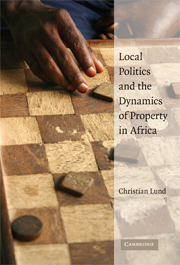Book contents
- Frontmatter
- Contents
- List of Maps, Figures, and Tables
- Acknowledgments
- Abbreviations
- Map 1 The Gold Coast, 1907
- Map 2 Regions of Ghana since 1983
- 1 Introduction
- 2 “This Situation Is Incongruous in the Extreme”: The History of Land Policies in the Upper Regions of Ghana
- 3 Who Owns Bolgatanga? The Revival of the Earthpriest and Emerging Tensions over Property
- 4 Seizing Opportunities: Chieftaincy, Land, and Local Administration
- 5 Settled Facts or Facts to Settle: Land Conflicts under Institutional Uncertainty
- 6 “Bawku Is Still Volatile”: Ethnopolitical Conflict and State Recognition
- 7 The Rent of Nonenforcement: Access to Forest Resources
- 8 Small Dams and Fluid Tenure
- 9 Conclusion
- References
- Index
5 - Settled Facts or Facts to Settle: Land Conflicts under Institutional Uncertainty
Published online by Cambridge University Press: 25 July 2009
- Frontmatter
- Contents
- List of Maps, Figures, and Tables
- Acknowledgments
- Abbreviations
- Map 1 The Gold Coast, 1907
- Map 2 Regions of Ghana since 1983
- 1 Introduction
- 2 “This Situation Is Incongruous in the Extreme”: The History of Land Policies in the Upper Regions of Ghana
- 3 Who Owns Bolgatanga? The Revival of the Earthpriest and Emerging Tensions over Property
- 4 Seizing Opportunities: Chieftaincy, Land, and Local Administration
- 5 Settled Facts or Facts to Settle: Land Conflicts under Institutional Uncertainty
- 6 “Bawku Is Still Volatile”: Ethnopolitical Conflict and State Recognition
- 7 The Rent of Nonenforcement: Access to Forest Resources
- 8 Small Dams and Fluid Tenure
- 9 Conclusion
- References
- Index
Summary
I sat upon the shore
Fishing, with the arid plain behind me
Shall I at least set my lands in order?
T. S. Eliot, The Waste LandIntroduction
As we have seen in earlier chapters, land claims are often tightly wrapped in questions of authority and the politics of jurisdiction. Few land issues are not also in some way issues of authority. For this chapter, however, emphasis differs as attention is primarily paid to two aspects of everyday struggles over property. First, the chapter demonstrates the relative inconclusiveness and renegotiability of the question of landed property in and around Bolga, as well as the imaginative strategies employed to secure land rights in the area. It shows how political-legal questions about property are negotiated and fought over outside the formal legal arenas. Second, the cases demonstrate people's simultaneous contrasting efforts to curb the negotiability. It shows how important it is to create “established facts,” however varied.
Contrary to Western legal thought, claims in a rural African context are not forfeited merely because they are delayed. In her work on the Chagga in Tanzania, Sally Falk Moore (1992: 29) points out how such claims rarely perish:
[T]o be worth anything a claim must endure until the obligee has the means to pay it. That may take more than one generation. An in-definitive time frame can be a major economic element in the effectiveness of a claim. As the Chagga say, it is no use claiming a cow from a man who does not have one. […]
- Type
- Chapter
- Information
- Local Politics and the Dynamics of Property in Africa , pp. 90 - 107Publisher: Cambridge University PressPrint publication year: 2008



